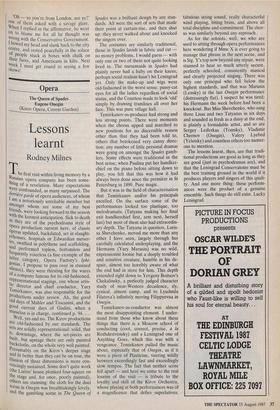Opera
The Queen of Spades Eugene Onegin (Kirov Opera, Covent Garden)
Lessons learnt
Rodney Milnes
The first visit within living memory by a Russian opera company has been some- thing of a revelation. Many expectations were confounded, as many surpassed. The derriere garde of opera audiences, of whom I am a notoriously unreliable member but amongst whom are some of my best friends, were looking forward to the season with the keenest anticipation. Sick to death as they are of the psychodrama style of opera production current here, of classic operas updated, backdated, set in slaught- erhouses, hospitals or Edwardian nurser- ies, swathed in polythene and scaffolding, and performed topless, bottomless and frequently voiceless (a fine example of the latter category, Opera Factory's 1phi- eenuls, I propose to pass over in stunned silence),
they were thirsting for the wares
of a company famous for its old-fashioned, representational stagings, one whose artis- tic director and chief conductor, Yury Temirkanov, was also responsible for the Productions under review. Ah, the good old days of Mahler and Toscanini, and the good current days of Giulini, when a musician is in charge, continued p. 94. . Well, yes and no. The Kirov productions are old-fashioned by our standards. The sets are solidly representational: solid, that is, downstage, where the set-pieces are built, but upstage there are only painted backcloths, on the whole very well painted. Presumably on the Kirov's deeper stage and lit better than they can be on tour, the illusion of three dimensions is more con- vincingly sustained. Some don't quite work (the Larins' house plonked four-square on the stage and, for once, poorly painted), others are stunning: the cloth for the duel scene in Onegin was breathtakingly lovely, and the gambling scene in The Queen of
Spades was a brilliant design by any stan- dards. All were the sort of sets that made their point at curtain-rise, and then shut up: they never walked about and knocked the singers over.
The costumes are similarly traditional, those in Spades lavish in fabric and cut — no money problems, I would guess — with only one or two of them not quite looking lived in. The nursemaids in Spades had plainly never had a baby on their knees; perhaps social realism hasn't hit Leningrad yet. Only the make-up and wigs were old-fashioned in the worst sense: pussy-cat eyes for all the ladies regardless of social status, and the Countess made to look 'old' simply by drawing tramlines all over her face. This was pure village hall.
Ternirkanov-as-producer had strong and less strong points. There were moments when the chorus upped and marched to new positions for no discernible reason other than that they had been told to, others that betokened very canny direc- tion: any number of little personal dramas were going on amongst the Spades gamb- lers. Some effects were traditional in the best sense; when Paulina put her handker- chief on the piano before sitting down to play, you felt that this was how it had always been done since the premiere in St Petersburg in 1890. Pure magic.
But it was in the field of characterisation that Temirkanov and/or his principals excelled. On the surface some of the performances looked too plastique, too melodramatic (Tatyana making her final exit handkerchief first, arm next, herself last) but most of them also had extraordin- ary depth. The Tatyana in question, Laris- sa Shevchenko, moved me more than any other I have seen, largely through her carefully calculated underplaying, and the Hermann (Yury Marusin) was no wild, expressionist loonie but a deeply troubled and sensitive creature, humble in his de- spair, almost too horribly aware of what the end had in store for him. This depth extended right down to Yevgeny Boitsov's Chekalinsky, a perfectly judged character study of near-Western decadence, sly, cynical, almost camp, and to Lyudmila Filatova's infinitely moving Filippyevna in Onegin.
Temirkanov-as-conductor was almost the most disappointing element. I under- stand from those who know about these things that there is a Moscow school of conducting (cool, correct, precise, a fa Rozhdestvensky) and a Leningrad one of Anything Goes, which this was with a vengeance. Temirkanov pulled the music about, especially that of Onegin, as if it were a piece of Plasticine, veering wildly between exceedingly fast and exceedingly slow tempos. The fact that neither score fell apart — and here we come to the real lessons of the visit — is tribute to the loyalty and skill of the Kirov Orchestra, whose playing at both performances was of a magnificence that defies superlatives: fabulous string sound, really characterful wind playing, biting brass, and above all total discipline and commitment. The chor- us was similarly beyond any reproach.
As for the soloists, well, we who are used to sitting through opera performances here wondering if Mme X is ever going to manage that phrase in the next scene, and is Sig. Y's top now beyond any repair, were stunned to hear so much utterly secure, perfectly schooled, consistently musical and clearly projected singing. There was only one principal who fell below the highest standards, and that was Marusin (Lensky) in the last Onegin performance (distressingly flat). I suspect he was tired: his Hermann the week before had been a knockout. But Miss Shevchenko, who sang three Lisas and two Tatyanas in six days and sounded as fresh as a daisy at the end, is plainly a formidable artist, and so are Sergey Leiferkus (Tomsky), Vladimir Chernov (Onegin), Valery Lyebed (Yeletsky) and countless others too numer- ous to mention.
The lessons learnt, then, are that tradi- tional productions are good as long as they are good (just as psychodramas are), and that the Leningrad Conservatoire must be the best training ground in the world if it produces players and singers of this quali- ty. And one more thing: these perform- ances were the product of a genuine ensemble. Such things do still exist. Lucky Leningrad.


















































 Previous page
Previous page